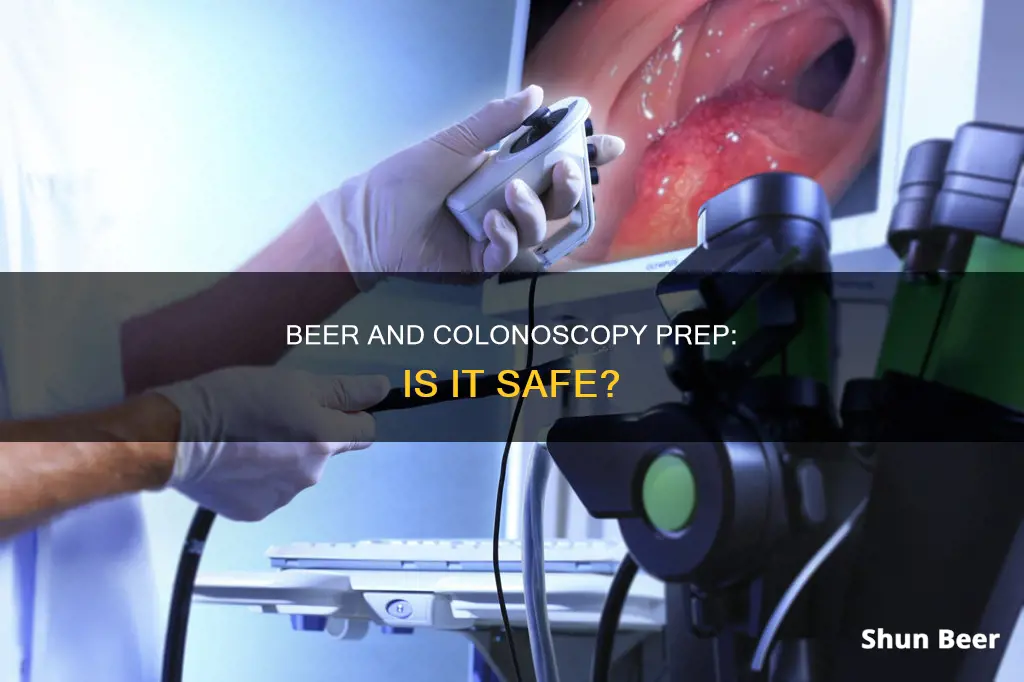
It is strongly advised that you do not drink beer or any other alcoholic beverage while prepping for a colonoscopy. Alcoholic drinks can cause dehydration, and you will already be losing a lot of fluids due to the pre-colonoscopy laxative cleanse. Dehydration can cause side effects such as mood changes and irritability. Alcohol may also interact with the sedatives used during the procedure and can leave residue in your colon, interfering with the doctor's interpretation of your colon health.
| Characteristics | Values |
|---|---|
| Should you drink beer while colonoscopy prepping? | No |
| Why? | Beer is an alcoholic drink, and alcoholic drinks should be avoided during colonoscopy prep |
| Why should alcoholic drinks be avoided during colonoscopy prep? | Alcoholic drinks can cause dehydration, interfere with a doctor's interpretation of your colon health, interact with sedatives used during the procedure, cloud your judgement, and leave residue in your colon |
What You'll Learn

Beer is not recommended before a colonoscopy
Firstly, beer and other alcoholic beverages can lead to dehydration. Colonoscopy prep involves taking laxatives, which already cause a significant loss of fluids. Therefore, drinking beer before the procedure will only worsen dehydration and its associated side effects, such as mood changes and irritability. It is crucial to stay hydrated and replenish fluids and electrolytes by drinking water or other clear, hydrating beverages.
Secondly, alcohol may interact with the sedatives used during the colonoscopy procedure. It may increase the required dosage of anesthesia and linger in your system, necessitating a longer recovery period. Alcohol can also interfere with certain medications, such as anxiety and depression medication, high blood pressure medication, and anti-seizure medication. These interactions can hinder effective colonoscopy preparation, the success of the procedure, and your overall health.
Additionally, alcohol can cloud your judgment and alter your thought process. It is essential to have a clear mind when following the colonoscopy prep instructions and communicating with your doctor about the results. Alcohol consumption can also leave residue in your colon, interfering with the accuracy of the procedure. Staining from red, blue, and purple products can resemble blood and mislead the interpretation of your colon health.
Lastly, beer, being a carbonated beverage, is not considered a clear liquid. The day before a colonoscopy, you are typically instructed to consume only clear liquids, which include water, fruit-flavored beverages like lemonade, clear sodas, tea or coffee without milk, and clear broths. Consuming only clear liquids ensures that no residue is left in the intestines or stomach, providing the doctor with a better view of the colon.
Beer and Nicotine: A Risky Mix?
You may want to see also

Alcohol may interfere with a doctor's interpretation of your colon health
Secondly, alcohol may leave a residue in your colon, which can interfere with the accuracy of the colonoscopy. This is because staining from red, blue, and purple drinks (including red wine) can look like blood and affect the doctor's ability to detect any problems accurately.
Thirdly, alcohol may impact the effectiveness of sedatives used during the procedure. It may mean you need a higher dose of anesthesia, and it can cause dangerous symptoms such as nausea, vomiting, aspiration, and accidental awareness.
Finally, alcohol can impair your cognitive function, clouding your judgment and lowering your inhibitions. This can interfere with your ability to follow pre-op protocols and may affect your ability to communicate clearly with your doctor and understand your results after the procedure.
Golf and Beer: Forest Park Course Drinking Rules
You may want to see also

Alcohol may interact with the sedatives used during the procedure
Alcohol is not recommended before a colonoscopy as it may interact with the sedatives used during the procedure. This means that drinking beer or other alcoholic beverages may increase the effects of the sedatives and lead to a higher dose of anesthesia. It is important to avoid alcohol before a colonoscopy to ensure the procedure is safe and effective.
Alcohol can also cause dehydration, which can be dangerous when combined with the fluid loss from the pre-colonoscopy laxative cleanse. Dehydration can cause unpleasant side effects such as mood changes and irritability. It is crucial to stay hydrated by drinking plenty of water or other clear, hydrating beverages before the procedure.
In addition, alcohol can interfere with certain medications, including anxiety and depression medication, high blood pressure medication, high cholesterol medication, and anti-seizure medication. It can also cloud your judgment, making it difficult to properly follow prep instructions and understand your results.
To ensure a successful colonoscopy, it is best to avoid alcohol and focus on staying hydrated and following your doctor's instructions. This will help ensure a safe and effective procedure.
Beer Breakdown: Understanding Its Effect on the Human Body
You may want to see also

Beer can lead to dehydration
Drinking beer before a colonoscopy is not recommended. This is because alcohol is a diuretic, which means it causes your body to remove fluids from your blood through your renal system, at a much quicker rate than other liquids. This can lead to dehydration, which is already a risk during the colonoscopy prep process.
Beer, or any other alcoholic drink, can lead to dehydration because it causes your body to lose fluids more quickly. This is due to its diuretic effect, which means you pass more urine. This is especially true if you drink on an empty stomach, as the alcohol will be absorbed into the bloodstream within minutes.
To avoid dehydration, it is important to drink plenty of water along with alcoholic drinks. However, even if you do this, alcohol can still cause dehydration because the water is flushed out of the body much faster than the alcohol is processed. This can lead to a higher blood alcohol concentration (BAC) and increase the risk of dehydration.
In addition to dehydration, alcohol can also affect the body in other ways, including:
- Skin: Alcohol can cause acne due to changing hormone levels and oxidative stress.
- Muscles: Drinking too much alcohol over time can lead to muscle stiffness, cramps, and even loss of muscle mass, known as alcoholic myopathy.
- Liver: Excessive alcohol consumption can lead to fat and protein build-up, scarring, and liver disease or cirrhosis.
- Kidneys: The kidneys can be damaged by high blood pressure and toxins as they process alcohol components into urine.
- Brain: Cognitive functions, such as making choices and responding to the environment, can be impaired by alcohol consumption.
Therefore, it is important to avoid drinking beer or any other alcoholic beverages before a colonoscopy to reduce the risk of dehydration and other potential negative effects on the body.
Beer and Kidney Health: What's the Connection?
You may want to see also

Alcohol can also mess with certain medications
Drinking alcohol before a colonoscopy is not recommended. Alcohol is dehydrating, and you will already be losing a lot of fluids due to the colonoscopy prep. Alcohol may also interact with the sedatives used during the procedure.
In general, alcohol can mess with certain medications, causing harmful, or even deadly, interactions. Alcohol can increase the side effects of some medications, such as drowsiness, dizziness, and light-headedness. This can interfere with your concentration and ability to operate machinery or drive a vehicle, leading to serious or even fatal accidents.
Alcohol can also decrease the effectiveness of some medications or render them useless. In other cases, alcohol may make certain drugs harmful or even toxic to the body. Alcohol can also increase the risk of complications when mixed with certain medications. For example, drinking alcohol while taking painkillers can increase the risk of stomach bleeding and ulcers.
Older people are at a particularly high risk of harmful alcohol-medication interactions. Aging slows the body's ability to break down alcohol, so it remains in the system longer. Older people are also more likely to be taking medications that interact with alcohol.
It is important to review your medications with your pharmacist or healthcare provider to check for potential drug-alcohol reactions. If you are unsure if a medication can be combined with alcohol, it is best to avoid alcohol consumption until your healthcare provider advises that it is safe to do so.
Beer Drinking: Weight Loss or Health Risk?
You may want to see also
Frequently asked questions
No, you should not drink beer or any other alcoholic beverage while prepping for a colonoscopy. Alcoholic drinks can cause dehydration, and you will already be losing a lot of fluids due to the colonoscopy prep. Alcohol may also interfere with the sedatives used during the procedure.
You will be losing a lot of fluids during the colonoscopy prep, so it's important to drink plenty of hydrating fluids like water and sports drinks to avoid dehydration, which can cause unpleasant side effects like mood changes and irritability.
Alcohol may interact with the sedatives used during a colonoscopy, and you may need a higher dose of anesthesia if you've been drinking. Colonoscopy sedatives can also linger in your system, so it's important to wait at least one full day after your procedure before consuming alcohol.
No, you should avoid drinking alcohol during the day leading up to your colonoscopy. It's also recommended to avoid red wine and other red, blue, and purple foods and drinks two days before the procedure to prevent staining of the colon, which can interfere with the accuracy of the test.
Instead of beer, you can drink clear liquids such as pulp-free juice, electrolyte sports drinks, clear sodas, tea or coffee without milk or cream, ice pops, clear hard candy, and fruit-flavored gelatin (avoiding red, orange, blue, or purple colors).







